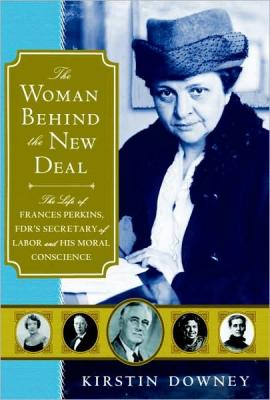
It’s weird to think that for the first seven years of my mother’s life, women were not allowed to vote in this country. Even now, we don’t utilize our full power, repeatedly voting to elect men who belittle us.
In 2020 we are recognizing our first measly hundred years with the vote, in honor of which, the League of Women Voters is sponsoring a traveling exhibit about a mostly unknown woman who probably had more influence on the trajectory of our country in the 20th century than any other individual, male or female. Fierce determination got results under the radar.
Meghan Sorensen of the Boston Globe wrote a tidy summary of Frances Perkins’s life and accomplishments to let readers know that the Perkins exhibit is at the State House, but only until February 7.
“Frances Perkins was the first woman to serve in the US Cabinet, a signature achievement in a groundbreaking life.” she writes. “The Massachusetts State House is hosting a traveling exhibit through Friday on the ‘Life and Legacy of Frances Perkins’ to coincide with the 100th anniversary of the National League of Women Voters.
“Here is a brief overview of Perkins’ life and accomplishments. (Historical information from the Frances Perkins Center in Maine.)
“Perkins was born Fannie Coralie Perkins in Boston in 1880. Although her parents were from Maine, she was raised in Worcester and attended Mount Holyoke College in South Hadley, earning a degree in physics while turning to economics and activism after learning about the lack of protections against women and children in factories.
“While her parents expected her to move home after college, Perkins moved to Chicago, [where] she worked with the poor and unemployed at the Chicago Commons and Hull House.
“In 1907, Perkins began working as the general secretary of the Philadelphia Research and Protective Association, which fought to stop newly arrived immigrant women and black women from the South from being forced into prostitution.
“Two years later, she began a fellowship with the New York School of Philanthropy, where she investigated childhood malnutrition among children living in Hell’s Kitchen. Alongside the fellowship, she earned her Master’s degree in sociology and economics at Columbia University. …
“In 1910, Perkins became the executive secretary of the New York City Consumers League, where she sought sanitary regulations for bakeries, fire protection for factories, and limiting work hours to 54 hours per week. After the Triangle Shirtwaist Factory fire that killed 146 workers, she followed Theodore Roosevelt’s suggestion and became the Committee on Safety’s executive secretary.
The group’s work led to what was referred to as ‘the most comprehensive set of laws governing workplace health and safety in the nation.’
“When Franklin D. Roosevelt became governor of New York in 1929, he hired Perkins to be the state’s Industrial Commissioner and oversee the labor department, [and] when Roosevelt became president in 1933, he asked Perkins to serve as labor secretary. She said yes, but with a condition — that he endorse her policy priorities, which included a 40-hour work week, minimum wage, unemployment compensation, the abolition of child labor, Social Security, and universal health insurance. …
“Under Roosevelt, Perkins achieved most her goals. The Fair Labor Standards Act in 1938 established a minimum wage and maximum work hours while banning child labor. As the head of the Committee on Economic Security, Perkins helped draft the 1935 Social Security Act, which offered unemployment, disability, and workers’ compensation. …
“ ‘A government should aim to give all the people under its jurisdiction the best possible life,’ Perkins said in a lecture titled ‘Labor Under the New Deal and the New Frontier.’ ”
More here. And do read Kristen Downey’s biography. It’s great. For my GoodReads review of that book, email me at suzannesmom@lunaandstella.com.

One of my heroes, this child of New England. Even though she wasn’t born in Maine, we Mainers kind of, sort of claim her as one of our own. Also, I was really struck by this line you wrote: “Even now, we don’t utilize our full power, repeatedly voting to elect men who belittle us.” You got that right. That’s what happens when a group of people, whatever the gender or ethnicity, internalizes a toxic message from the dominant culture. As a Franco-American, I unfortunately know all too well how that works.
LikeLike
According to the NYT, Democratic women in the recent Iowa Caucus preferred male presidential candidates. And we already know who GOP women prefer.
LikeLiked by 1 person
Sigh. We sure do.
LikeLike